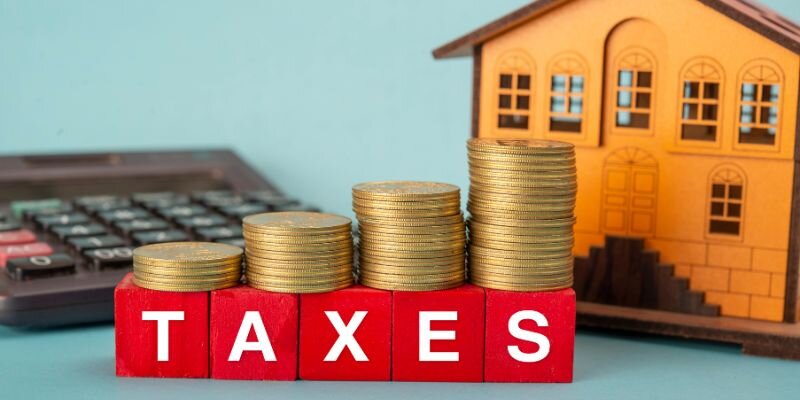
Understanding Property Tax Rates: An Overview for Homeowners
It is essential for homeowners and real estate investors to have a good grasp of the property tax rates in Raleigh, NC. Local services like schools, roads, and emergency services rely on the revenue generated by property taxes, which are based on the assessed value of a property.
In Raleigh, property tax rates can vary depending on the location within Wake County and influence decisions about buying or investing in real estate. Homeowners should know that the city periodically reassesses property values to ensure taxes reflect current market conditions. If you’re exploring these decisions, the company in Raleigh, NC can help guide you through the process with local expertise.
Even if the tax rate remains stable, a significant increase in a property’s assessed value could lead to higher property taxes. Understanding available exemptions or deductions is essential for reducing overall tax liability.
For instance, homestead exemptions can relieve primary residences under certain conditions. Staying informed about changes in local government policies regarding property taxes can help homeowners and investors plan financially and make informed decisions when purchasing or holding real estate in Raleigh.
How Property Taxes Are Calculated: Factors and Formulas

Homeowners and real estate investors in Raleigh, NC need to know how property taxes are figured out in order to make smart choices. The Wake County Tax Assessor’s Office decides a property’s assessed value, which is what property tax computations are mostly based on.
This office evaluates properties based on market values, recent sales data, and property condition to ensure an accurate assessment. The assessed value is then multiplied by the property tax rate, which is expressed as a percentage known as the millage rate.
This rate can change in Raleigh based on how much money the city has and what voters have approved for public services like schools and infrastructure projects. Also, certain property owners may be able to get tax breaks or exemptions, including homestead exemptions or senior citizen discounts, which can lessen the amount of tax they owe.
Understanding these elements helps homeowners anticipate their annual property tax obligations and allows real estate investors to estimate better potential returns on investment in the Raleigh area market.
The Impact of Location on Property Tax Rates
Location plays a crucial role in determining property tax rates in Raleigh, NC, significantly affecting homeowners and real estate investors. Factors such as neighborhood desirability, proximity to amenities, and local school district quality influence property taxes.
Due to increased property values, property tax rates tend to be higher in areas with high demand and premium services. For instance, properties situated near downtown Raleigh or within affluent communities often incur higher taxes than those in less developed or peripheral regions.
varying areas of Raleigh may also see varying effects on rates due to differences in municipal budget requirements and local government initiatives. If homeowners want to keep their spending in check and real estate investors want to maximize their profits, they must understand these locational factors.
What Homeowners Need to Know About Property Assessments
Homeowners in Raleigh, NC, should familiarize themselves with the intricacies of property assessments to better understand their property tax obligations. The property assessment process involves determining the fair market value of a home, which directly impacts the amount of property tax owed.
In Raleigh, assessments are typically conducted by the Wake County Revenue Department and are usually updated every four years through a revaluation process. During this period, assessors evaluate the property’s location, size, age, and condition to estimate its current market value.
Homeowners must know that significant improvements or renovations can increase their property’s assessed value and raise their tax liability. Conversely, economic downturns or damage to the property could lead to a reduction in assessed value.
Understanding how these assessments work will help homeowners anticipate changes in their annual tax bills and plan accordingly. Additionally, homeowners need to review assessment notices carefully and appeal if they believe there has been an error in valuation, as this could result in substantial savings on their overall tax burden.
Exemptions and Deductions: Reducing Your Property Tax Bill
Understanding the available exemptions and deductions can significantly reduce your property tax bill as a homeowner or real estate investor in Raleigh, NC. Property tax exemptions are crucial for lowering taxable value and can include options like the homestead exemption for primary residences, which is particularly beneficial for seniors and disabled veterans.
Also, Raleigh has some deductions that can help you pay less in taxes. Under state or local programs, improvements that make a building more energy efficient may be eligible for certain tax credits or deductions.
Investors in real estate would be wise to investigate the advantages of conservation easements and historic property designations. In addition to reducing property taxes, these designations protect cultural landscapes. Raleigh property owners can maximize their assets and minimize their annual tax liabilities by wisely utilizing these deductions and exemptions.
The Role of County Governments in Setting Property Taxes
County governments are crucial in determining property tax rates in Raleigh, NC, impacting homeowners and real estate investors. These local governmental bodies assess the value of properties within their jurisdiction to establish a fair market value, which is the basis for calculating property taxes.
The assessed values are then multiplied by the established tax rate or millage rate set by the county government. This process is integral to generating revenue for essential public services such as education, infrastructure maintenance, law enforcement, and emergency services.
County officials meet regularly to evaluate budgetary needs and adjust property tax rates to ensure adequate funding for these critical areas. Understanding how these rates are set provides homeowners with insight into potential changes in their financial obligations.
Meanwhile, real estate investors must consider these tax implications when assessing property profitability and overall investment strategy. By closely monitoring the decisions made by county governments regarding property taxes, both groups can better navigate the financial landscape of owning property in Raleigh.
The Connection Between Public Services and Property Taxes
In Raleigh, NC, property taxes are crucial in funding essential public services that benefit homeowners and real estate investors. These taxes are directly tied to the maintenance and development of infrastructure such as roads, schools, and emergency services.
Property tax revenues fund well-maintained public amenities, which Raleigh homeowners rely on to keep their neighborhoods attractive and safe. Understanding the connection between property taxes and public services is vital for real estate investors, as it influences property values and rental demand.
High-quality public services enhance community appeal, potentially increasing property values over time. The funds collected from property taxes support local government efforts to improve community facilities, attracting more residents and businesses to Raleigh.
This dynamic relationship underscores how property tax rates are integral to sustaining Raleigh’s quality of life while impacting real estate investment strategies.
Understanding Millage Rates: a Key Component of Your Tax Bill
Understanding millage rates is essential for homeowners and real estate investors in Raleigh, NC, as these rates are a significant factor in determining property tax bills. The millage rate, expressed in mills per dollar of assessed property value, directly influences the tax owed on a property.
Like many other jurisdictions, Raleigh’s local governments set these rates to fund essential services such as public schools, emergency services, and infrastructure maintenance. Knowing how the millage rate is calculated and applied can provide valuable insights into potential tax liabilities.
Understanding these rates can help real estate investors evaluate investment properties and project future expenses. Homeowners can also benefit from grasping the intricacies of millage rates to budget effectively for annual taxes.
Since property values and local government budgets fluctuate, staying informed about changes in millage rates can help residents anticipate shifts in their financial obligations related to property ownership.
The Effect of School Districts on Local Property Taxes
In Raleigh, NC, the schools’ influence on local property taxes is significant for homeowners and real estate investors. Property tax rates are often directly linked to the funding needs of public schools, meaning that areas within desirable school districts typically experience higher property tax rates.
This occurs because quality education is a priority for many residents, increasing demand and raising home values in these areas. Homeowners benefit from this increased demand by appreciating their property’s value; however, they must also shoulder higher property taxes.
Understanding the nuances of school district boundaries is crucial for real estate investors when assessing potential investments in Raleigh’s competitive housing market. Investors must evaluate how proximity to esteemed schools could affect rental yields and long-term appreciation potential while considering the heightened property tax obligations accompanying such advantages.
The correlation between school district quality and property tax rates underscores the importance of educational infrastructure in influencing real estate dynamics across Raleigh neighborhoods.
How Economic Development Projects Influence Local Taxation

Economic development projects in Raleigh, NC, significantly impact local property tax rates, affecting homeowners and real estate investors. As the city undertakes new infrastructure developments, commercial expansions, and revitalization initiatives, the demand for public funding increases.
These projects often increase property values due to enhanced amenities and improved accessibility, resulting in higher assessed values and subsequently higher property taxes. If tax rates are adjusted to support these economic advancements, this will mean increased equity and greater tax burdens for homeowners.
Real estate investors might see opportunities for lucrative returns as property values appreciate; however, they must account for the potential rise in operational costs due to elevated taxation. Economic development can drive population growth and business attraction, which further influences municipal budgets and necessitates carefully balancing tax rate adjustments to sustain infrastructure improvements while maintaining affordability for residents.
Comparing Property Tax Rates Across North Carolina Cities
When comparing property tax rates across North Carolina cities, Raleigh is a key area of interest for homeowners and real estate investors. Raleigh’s property taxes are influenced by various factors, including local government budgets, education funding, and infrastructure development.
While Raleigh’s property tax rates may be competitive compared to other major cities in North Carolina, such as Charlotte and Durham, each city presents unique fiscal demands that affect tax assessments. For instance, Asheville might have different priorities that could lead to variations in its property tax structure.
Real estate investors often analyze these differences to determine the potential return on investment when purchasing properties. Understanding how Raleigh’s property taxes compare with those in Greensboro or Wilmington can provide invaluable insights into real estate market trends and investment opportunities throughout the state. For Cary homeowners, working with a cash for houses company in Cary can also be a practical solution when tax burdens outweigh the benefits of holding property.
The variability in property tax rates among North Carolina cities underscores the importance of localized research for anyone considering buying or investing in real estate within this diverse region.
Raleigh, Nc: a Detailed Guide to Local Property Tax Regulations
Raleigh, NC, known for its vibrant culture and growing economy, presents a complex landscape of property tax regulations that homeowners and real estate investors must navigate. In Raleigh, property taxes are determined by the property’s assessed value, which is established through periodic appraisals.
The tax rate, expressed in dollars per $100 of assessed value, is set annually by local government authorities to fund essential services such as schools, public safety, and infrastructure maintenance. Homeowners benefit from various exemptions and deductions that can reduce their taxable amount, including the North Carolina Homestead Exclusion for qualifying residents.
Meanwhile, real estate investors should be aware of how property improvements or changes in zoning might impact assessment values and future tax liabilities. Additionally, Raleigh’s dynamic real estate market means that staying informed about potential changes in property assessments due to market fluctuations is crucial for managing fiscal responsibilities effectively.
Understanding these local property tax regulations is vital for making informed decisions regarding homeownership and investment strategies within Raleigh’s diverse neighborhoods.
Historical Trends in Raleigh’s Property Tax Rates
Over the past few decades, Raleigh, NC, has experienced significant changes in property tax rates, influenced by rapid urban growth and shifts in economic policies. Raleigh’s property tax rate has historically been relatively stable, benefiting homeowners and real estate investors. A predictable fiscal environment
However, as the city expanded and infrastructure demands increased, periodic adjustments to these rates became necessary. In the early 2000s, Raleigh saw modest increases in property taxes to accommodate burgeoning public service needs and educational investments.
More recently, assessments have reflected both the rising value of real estate due to a booming housing market and strategic efforts by local government to balance revenue with community development goals. These historical trends illustrate how Raleigh’s property tax landscape has evolved in response to demographic pressures and economic strategies to foster sustainable growth while maintaining affordability for residents and attractiveness for real estate investment opportunities.
Navigating Commercial vs Residential Property Taxes in Raleigh, NC
Understanding the differences between commercial and residential property taxes in Raleigh, NC, is crucial for both homeowners and real estate investors. Residential properties typically benefit from lower property tax rates compared to commercial properties, largely due to their classification and use.
The Wake County Tax Assessor evaluates properties annually, considering location, market value, and property type. For residential properties, the tax rate is applied uniformly across single-family homes, townhouses, and condominiums.
In contrast, commercial properties, such as office buildings, retail spaces, and industrial sites, often face higher tax rates because they generate income and have different assessment criteria.
Real estate investors must consider these distinctions when purchasing property in Raleigh to ensure accurate financial forecasting. Additionally, any zoning or land use changes can significantly impact property tax liabilities for residential and commercial sectors.
Understanding these nuances enables property owners to better navigate Raleigh’s property tax system’s complexities and optimize their investment strategies accordingly.
How to Appeal a Property Tax Assessment in Raleigh, NC
Appealing a property tax assessment in Raleigh, NC, requires a clear understanding of the local tax system and careful preparation. Homeowners and real estate investors should review their property assessment notices to identify discrepancies or errors.
Gather evidence to support your claim, such as recent home appraisals or sales data for comparable properties in Raleigh. Filing an appeal involves submitting the necessary documentation to the Wake County Tax Administration within the specified time frame, often detailed on the assessment notice.
During this process, being familiar with North Carolina’s property tax laws and guidelines is beneficial for arguing your case effectively. Attending a hearing might be part of the appeal procedure, where you can present evidence to justify why your property’s assessed value should be adjusted.
Engaging with a local real estate professional or attorney who understands Raleigh’s property market can also provide valuable insights and increase your chances of success in reducing your property tax burden. However, if appealing doesn’t provide enough relief, you may choose another route — working with professionals who say we buy houses in Raleigh for cash to simplify the process.
Future Changes in Raleigh’s Real Estate Market and Their Impact on Taxes
As Raleigh’s real estate market evolves, homeowners and real estate investors must stay informed about potential changes impacting property tax rates. The city’s rapid growth and development could lead to reassessments of property values, directly affecting property taxes for residents and investors alike.
With increasing demand for housing and commercial spaces, the local government may adjust tax policies to accommodate infrastructure improvements and public service expansion. In this dynamic environment, stakeholders must closely monitor policy shifts that influence taxation, as these adjustments could alter the financial landscape for investment strategies and homeownership costs in Raleigh. For those considering selling, understanding how our process works can provide clarity and a faster path to managing property-related expenses.
Understanding these future changes is crucial for making informed decisions in a fluctuating market where tax implications significantly influence overall investment returns and home affordability.
How Much Is $100,000 a Year After Taxes in North Carolina?
When considering the impact of property tax rates on your income, homeowners and real estate investors in Raleigh, NC, need to understand how much $100,000 a year translates into after taxes. In North Carolina, state income taxes play a significant role in determining your net income.
25%, meaning that on a $100,000 salary, you would pay approximately $5,250 in state income taxes alone. However, this is just one part of the overall tax picture. Federal income taxes and local property taxes specific to Raleigh and Wake County must also be considered. Property tax rates in Raleigh are relatively moderate compared to other regions, but they can still impact your disposable income significantly. For homeowners and investors analyzing their financial landscape in North Carolina’s capital city, understanding these figures is crucial for effective budgeting and investment planning. Calculating your take-home pay involves deducting federal and state income taxes and factoring property tax obligations based on assessed home values within Raleigh’s jurisdiction. This comprehensive evaluation helps ensure that current homeowners and prospective real estate investors can make informed decisions regarding their regional investments and financial commitments.
At What Age Do Seniors Stop Paying Property Taxes in NC?

In North Carolina, seniors may be eligible for property tax relief rather than an outright exemption from paying property taxes. Homeowners aged 65 and older can benefit from the state’s Homestead Exclusion program, which provides significant property tax reductions based on specific criteria.
To qualify, seniors must have a legal or equitable interest in the property and use it as their primary residence. Additionally, their income must not exceed a certain threshold set by the state, which is adjusted annually.
This program aims to ease the financial burden on elderly homeowners while ensuring they continue enjoying their homes without the stress of escalating property tax rates. Real estate investors focusing on properties in Raleigh, NC, should consider these factors when evaluating potential investment returns, as the Homestead Exclusion can impact market demand and valuation for properties targeting senior residents.
Understanding how senior property tax relief works in North Carolina is crucial for both homeowners and real estate investors aiming to make informed decisions about property investments.
What is the property tax rate in Wake County in 2026?
Understanding the property tax rate in Wake County is crucial for homeowners and real estate investors planning for 2026. As of the latest assessments, Wake County utilizes an ad valorem property tax system, meaning taxes are based on the assessed value of real estate properties.
The projected property tax rate in Wake County for 2026 is expected to reflect municipal budgetary requirements and regional economic conditions. Homeowners should anticipate a rate that aligns with the county’s commitment to funding public services such as education, infrastructure, and emergency services.
Real estate investors need to consider these rates when calculating potential returns on investment properties within Raleigh and the surrounding areas of Wake County. Understanding these property tax dynamics allows homeowners and investors to make informed financial decisions regarding their real estate ventures in 2026.
Is Property Tax High in NC?
When evaluating whether property taxes are worth it in North Carolina, particularly in Raleigh, homeowners and real estate investors must consider several factors. North Carolina generally has a moderate property tax rate compared to other states, but specific rates can vary significantly across different counties and municipalities.
In Raleigh, the Wake County property tax rate combines county and city taxes, directly impacting property owners’ overall costs. While Raleigh’s property tax rates might be considered reasonable relative to national averages, they are crucial for budgeting and investment planning.
Homeowners should assess how these taxes affect planning and financial planning, while real estate investors must factor them into profitability analyses and cash flow projections. Understanding Raleigh’s specific property tax computations, including assessments based on fair market value and potential exemptions or relief programs offered by the state or local government, is vital for making informed decisions about buying or investing in properties within the area.
Helpful North Carolina Blog Articles
- Selling Your Home And Relocating In North Carolina
- Selling A Home With Tenants In North Carolina
- Taxes When Selling Your House In North Carolina
- Selling Your Home Amid Divorce in North Carolina
- Selling A Fixer-upper Home In North Carolina’s Real Estate Market
- Selling A House While it is in Foreclosure in North Carolina
- Selling a Probate House in North Carolina
- Selling Your Home Without A Realtor In North Carolina
- Sell Your North Carolina Home With An Existing Mortgage
- Tenant Damage to Property In North Carolina
- Sell Your Home Despite Mold Issues in North Carolina
- Best And Worst Neighborhoods For Real Estate Investments In NC
- Property Tax Rates For Homeowners And Real Estate Investors In NC
- Understanding North Carolina Quitclaim Deed Rules
- Expert Property Management Services For Homes In North Carolina

| TAXPAYERS | TAX PAYMENT | TAX-BASED | INFORMATION | CITY OF RALEIGH | RALEIGH, NORTH CAROLINA |
| WAKE COUNTY, NC | WAKE COUNTY, NORTH CAROLINA | EFFECTIVE TAX RATES | STATE OF NORTH CAROLINA | DURHAM COUNTY | |
| LUXURY REAL ESTATE | PAYMENT | MARKETING | MARKETING CAMPAIGNS | CITY OF CHARLOTTE | |
| FISCAL YEAR | FEES | MORTGAGES | SMARTASSET | THE RESEARCH TRIANGLE | RALEIGH-DURHAM |
| MEDIAN | INVENTORY | PUBLIC INFRASTRUCTURE | WAKEGOV.COM | VISA | U.S. |
| TAX BREAK | COUNTY ASSESSOR | REAL ESTATE BROKER | REAL ESTATE BROKERAGE | POLICE | PER CAPITA |
| LIBRARIES | FINANCIAL ADVISOR | FEEDBACK | CREDIT CARD | OF NORTH CAROLINA | STATE OF NORTH CAROLINA |
